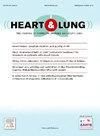肺动脉高压的炎症和心脏生物标志物:IL-34 的预后作用
IF 2.4
4区 医学
Q2 CARDIAC & CARDIOVASCULAR SYSTEMS
引用次数: 0
摘要
背景:肺动脉高压(PAH)的特点是肺动脉压力增高,发病率和死亡率都很高。炎症过程在 PAH 的发病机制中至关重要,炎症细胞和介质出现在疾病进展的早期。IL-34 参与炎症通路表明,IL-34 可能是 PAH 进展过程中的一个重要角色,同时影响肺压和血管变化:本研究的目的是调查 IL-34 水平与肺动脉高压(PAH)之间的相关性,旨在加深对 PAH 潜在分子机制的理解,并探索 IL-34 作为生物标记物的潜力:马拉蒂亚-图尔古特-奥扎尔医院(Malatya Turgut Ozal Eğitim ve Araştırma Hastanesi)通过右心导管检查确诊的连续 PAH 患者(2022 年 12 月至 2024 年 4 月)。根据ESC/ERS指南,根据包括临床参数、血液动力学测量和生物标志物在内的综合风险评估,将患者分为低风险组和高风险组。测量血清IL-34、hs-CRP和NT-proBNP水平,并与健康对照组进行比较。进行了超声心动图评估和统计分析,包括 ROC 分析,以评估生物标志物的意义和预测能力:结果:低风险和高风险 PAH 患者的平均年龄分别为(42 ± 7.2)岁和(45 ± 5.5)岁。对照组的平均年龄为 40 ± 6.4 岁。男性在低危组中占 54.29%,在高危组中占 56%,在对照组中占 53.3%。与对照组相比,PAH 患者的 IL-34 和 hs-CRP 水平明显升高。IL-34 与肺动脉收缩压、RA 面积和 NT-proBNP 水平呈正相关。多变量分析显示,IL-34 和 hs-CRP 是 PAH 的独立预测因子。IL-34水平>29.8 pg/mL可预测PAH,灵敏度为78%,特异度为69%;IL-34水平>44.4 pg/mL可预测高风险PAH,灵敏度为84%,特异度为77%:IL-34和hs-CRP水平升高与PAH严重程度和右心室功能障碍有关,这表明IL-34具有作为诊断和预后生物标志物的潜力。还需要进一步的研究来验证这些发现,并探索以IL-34为靶点的pH管理疗法。本文章由计算机程序翻译,如有差异,请以英文原文为准。
Inflammatory and cardiac biomarkers in pulmonary arterial hypertension: The prognostic role of IL-34
Background
Pulmonary arterial hypertension (PAH) is characterized by increased pulmonary artery pressure with significant morbidity and mortality. Inflammatory processes are crucial in PAH pathogenesis, with inflammatory cells and mediators present early in disease progression. IL-34 involvement in inflammatory pathways suggests that IL-34 could be an important player in the progression of PAH, influencing both pulmonary pressures and vascular changes.
Objective
The purpose of this study was to investigate the correlation between IL-34 levels and pulmonary arterial hypertension (PAH), aiming to enhance the understanding of the molecular mechanisms underlying PAH and explore IL-34′s potential as a biomarker.
Methods
Consecutive PAH patients diagnosed via right-heart catheterization at Malatya Turgut Ozal Eğitim ve Araştırma Hastanesi (Dec 2022 - Apr 2024) were enrolled. Patients were classified into low-risk and high-risk groups based on comprehensive risk assessments that included clinical parameters, hemodynamic measurements and biomarkers, in-line with ESC/ERS guidelines. Serum IL-34, hs-CRP, and NT-proBNP levels were measured and compared with those of healthy controls. Echocardiographic assessments and statistical analyses, including ROC analysis, were conducted to evaluate biomarker significance and predictive capabilities.
Results
The mean age of low-risk and high-risk PAH patients was 42 ± 7.2 years and 45 ± 5.5 years, respectively. The mean age of the control group was 40 ± 6.4 years. Males comprised 54.29 % of the low-risk group, 56 % of the high-risk group, and 53.3 % of the control group. IL-34 and hs-CRP levels were significantly elevated in PAH patients compared to controls. IL-34 correlated positively with systolic pulmonary artery pressure, RA area, and NT-proBNP levels. Multivariate analysis revealed that IL-34 and hs-CRP were independent predictors of PAH. IL-34 levels>29.8 pg/mL predicted PAH with 78 % sensitivity and 69 % specificity, while levels >44.4 pg/mL predicted high-risk PAH with 84 % sensitivity and 77 % specificity.
Conclusion
Elevated IL-34 and hs-CRP levels are associated with PAH severity and right ventricular dysfunction, suggesting IL-34′s potential as a diagnostic and prognostic biomarker. Further research is needed to validate these findings and explore IL-34-targeted therapies in pH management.
求助全文
通过发布文献求助,成功后即可免费获取论文全文。
去求助
来源期刊

Heart & Lung
医学-呼吸系统
CiteScore
4.60
自引率
3.60%
发文量
184
审稿时长
35 days
期刊介绍:
Heart & Lung: The Journal of Cardiopulmonary and Acute Care, the official publication of The American Association of Heart Failure Nurses, presents original, peer-reviewed articles on techniques, advances, investigations, and observations related to the care of patients with acute and critical illness and patients with chronic cardiac or pulmonary disorders.
The Journal''s acute care articles focus on the care of hospitalized patients, including those in the critical and acute care settings. Because most patients who are hospitalized in acute and critical care settings have chronic conditions, we are also interested in the chronically critically ill, the care of patients with chronic cardiopulmonary disorders, their rehabilitation, and disease prevention. The Journal''s heart failure articles focus on all aspects of the care of patients with this condition. Manuscripts that are relevant to populations across the human lifespan are welcome.
 求助内容:
求助内容: 应助结果提醒方式:
应助结果提醒方式:


